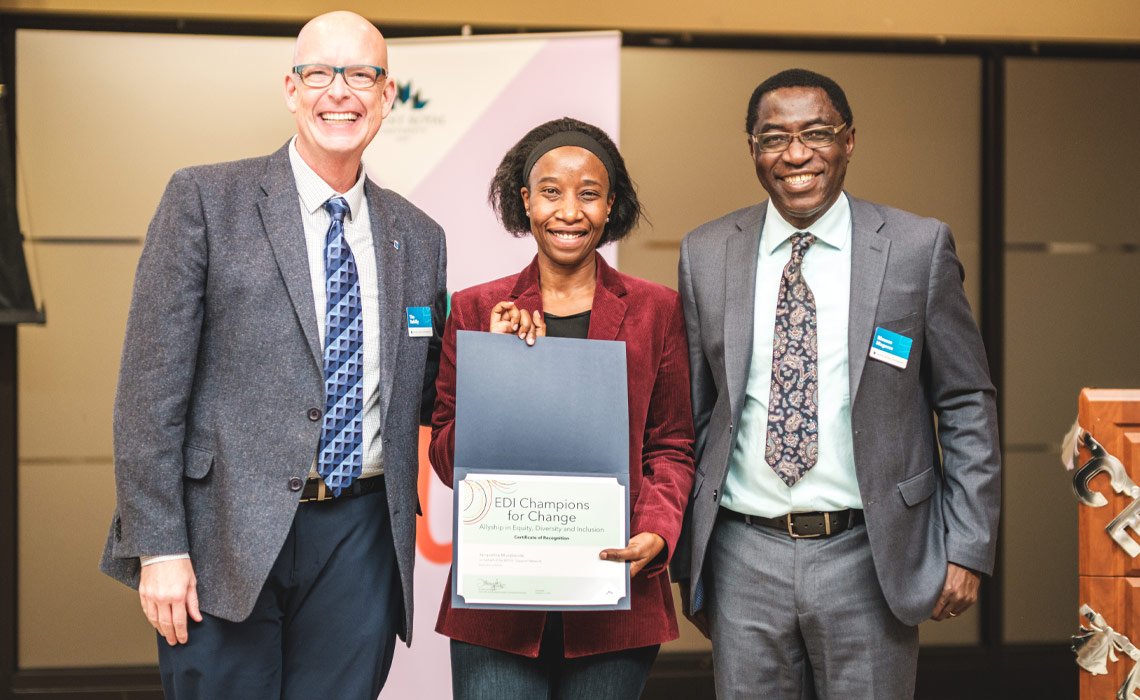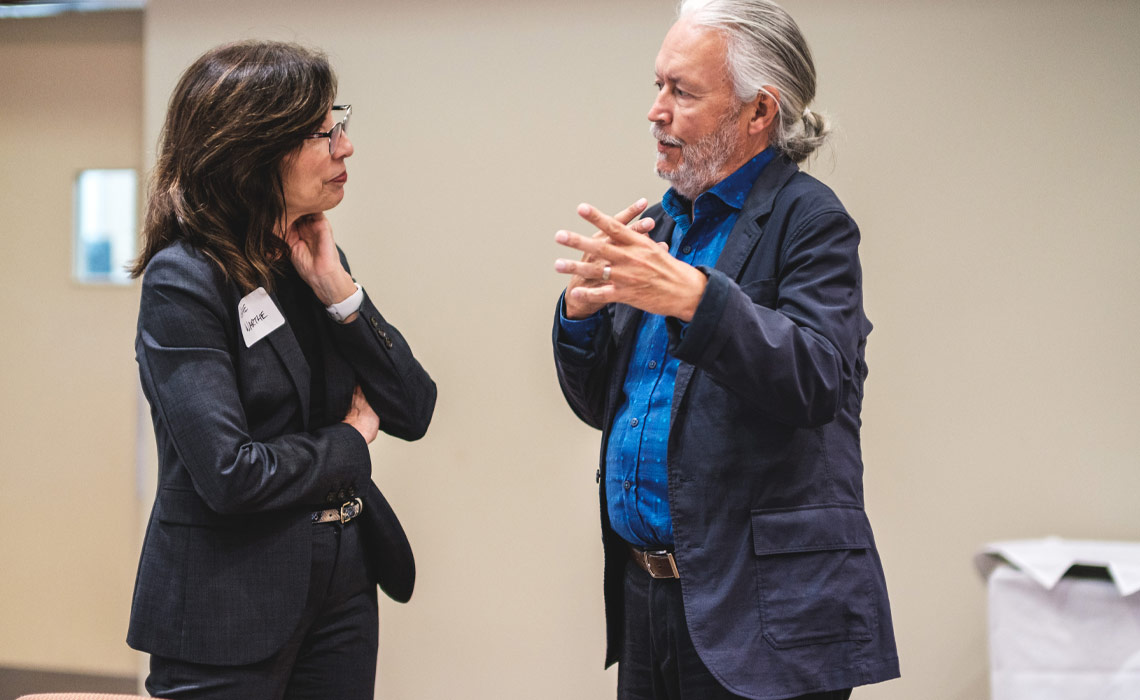Celebrating the early success of MRU’s EDI Opportunity Fund

The seeds of change nurtured by Mount Royal University’s EDI Opportunity Fund are growing, as a wide range of equity, diversity and inclusion initiatives bloom from concept to reality.
Since its inception in October 2022, the fund has provided financial support for 13 projects carried out by students, faculty members and staff. And with the next round of applications closing in January 2024, there are more projects on the horizon.
Dr. Moussa Magassa, PhD, associate vice-president, equity, diversity and inclusion, emphasizes how strategic investments can drive significant change in addressing systemic barriers.
“This fund is more than a financial resource — it’s a catalyst for change,” Magassa says. “It reflects Mount Royal’s commitment to fostering a campus environment where diversity thrives, every voice is heard and equity forms the foundation of our community.”
The fund operates under the stewardship of the Office of Equity, Diversity and Inclusion. It serves as a springboard for various EDI projects including program improvements, accessibility initiatives, EDI learning, educational workshops, guest speakers and student-led research projects.
A recent event celebrated the work and change made possible since the fund's launch, a year that saw enthusiastic participation with 55 applicants across 26 projects. Nearly $80,000 has been allocated so far, underscoring the fund's reach and impact. Dr. Tim Rahilly, PhD, president and vice-chancellor of Mount Royal University, spoke to those gathered. Resourcing efforts to achieve real change links the desire to act with the financial support to realize exceptional ideas, he said.
“A common thread through many of the initiatives is they created learning opportunities, which I am really happy about. When there is a chance to gain new knowledge, it is the ultimate investment,” Rahilly said. “This is what leads to new ideas, it builds energy that we apply to our work, and it informs what students read in their courses and maybe even allows them to consider a new perspective. I certainly hope to see more of this for years to come.”
One such opportunity was initiated by Dr. Christopher Grignard, PhD. Grignard enhanced his Indigenous courses by featuring the sunbonnet lodge tipi design (Natoosi saam Ikokaan) of his Blackfoot (Kainai) Elder Joe Eagle Tail Feathers. The icon takes centre stage as the first image that students in his courses click when they sign in to D2L Brightspace, the learning management system where their class materials are stored.
“D2L, with its mission to transform the way the world learns, aligns perfectly with the goals of Indigenization and decolonization," Grignard says. “This tipi design, especially the vision behind it, operates as a portal.
“It allows us to transcend conventional classroom boundaries, inviting students to see the world through an Indigenous lens as they step into what I refer to as being an Indigenous literary lodge.”
Before integrating the design into his courses, Grignard ensured he followed traditional protocol. He approached Eagle Tail Feathers (Iitsooahp'potah — “Attacks in the Water”), seeking permission at a pipe ceremony that he sponsored on the Blood Reserve. This ceremony was characterized by acts of reciprocity, embodying Grignard's commitment to community and tradition.
“It's essential to recognize that meaningful transfers, such as the sunbonnet lodge tipi design, necessitate giving back,” Grignard says. “This principle underscores the significance of mutual respect and the appreciation of the traditional knowledge sharing by Indigenous cultures."

In another application of the fund, Dr. Yasaman Amannejad, PhD, and a team of student research assistants in the Faculty of Science and Technology, propose using virtual reality to create immersive EDIA training scenarios.
Another one of the many blossoming successes of the EDI Opportunity Fund is a practicum agreement signed between the Łutsel K'é Dene First Nation and the Faculty of Health, Community and Education.
The agreement was signed on Sept. 30, 2023, Canada’s National Day for Truth and Reconciliation. It gives students the opportunity to gain hands-on experience setting up recreation programs while living in the northern fly-in-fly-out community.
Although the first students start their practicums this summer at the earliest, the actual agreement was months in the making. The partnership was solidified by an in-person visit to Łutsel K'é territory by Dr. Julie Booke, PhD, and Dr. Maggie Quance, PhD, of MRU, funded through the EDI Opportunity Fund. Together, they worked out the details of the student practicum arrangement with Łutsel K'é Chief James Marlowe while building relationships and understanding the community's lifestyle and needs.
“This trip was so important for us to see the place, meet the people and build that relationship with the Łutsel K'é people,” Booke says. “It was about more than a meeting. It was about creating connections that can last a lifetime.”
Plans are in the works to remove barriers to student participation and potentially develop programs with other Indigenous communities. It’s yet another example that demonstrates the snowball effect of one strategic investment.
Magassa extended his gratitude to the MRU community for its participation, which has been instrumental in the fund's success.
"Looking ahead, we are excited to see how this fund will continue to evolve and inspire,” Magassa says. “This is just the beginning. We anticipate that the upcoming year will bring even more impactful ideas to the forefront.”
The President and Vice-Chancellor also credited the discussions held by the President’s Equity, Diversity and Inclusion Advisory Committee in the creation of the fund. The group — students, faculty and staff committed to affirming MRU’s commitment to equity diversity and inclusion — first came together in the fall of 2020.
The next academic year promises exciting developments, with an additional contribution of $25,000 from the Office of the President, raising the total fund to $75,000 for the 2023-24 cycle. This increase will support more diverse projects, though the maximum allotment per project will be adjusted to $10,000 to accommodate a wider range of initiatives.
Increasing student engagement is a key objective for the upcoming year, with administrators introducing new submission formats like video to improve accessibility. As the fund continues, it not only supports a diverse set of projects but it also lays the groundwork for an environment where inclusivity is a lived reality.
“This is a journey of collaboration and discovery, where each step taken is a stride towards a more equitable, diverse and inclusive campus,” Magassa says. “Together, we are not only dreaming of a better future — we are actively constructing it, project by project, idea by idea.”
Learn more about the projects supported by the EDI Opportunity Fund.

